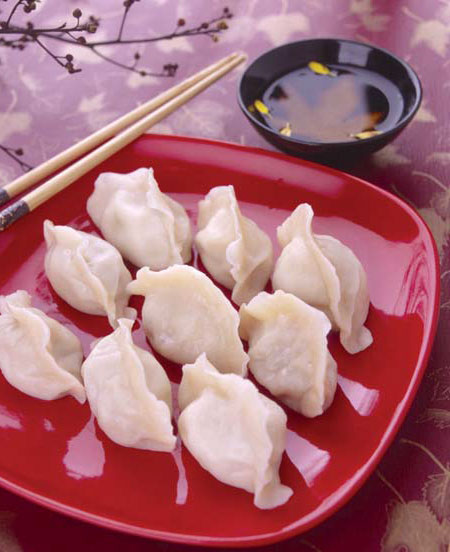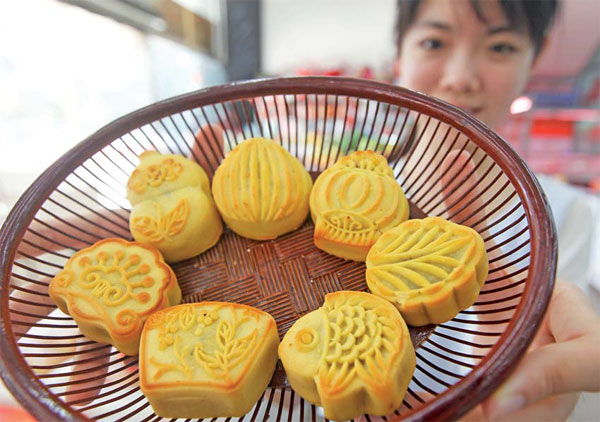Stellar time to celebrate womanhood

Editor's note: To understand China, sit down to eat. Food is the indestructible bond that holds the whole social fabric together and it is also one of the last strong visages of community and culture.
On the seventh day of the seventh lunar month, the skies sparkle with love and romance. This is when the Weaver Girl and her husband, the Cowherd, reunite on a bridge of magpies across the Milky Way.
This is also when girls in China show their support for the star-crossed lovers by offering food and prayers. They hope for two things -that they find the perfect match themselves, and that they will be gifted with those womanly skills the Weaver is famous for.
| Traditional snacks called qiaoguo are made from a dough of thick sugar syrup, flour and sesame seeds. Photos Provided to China Daily |
According to the fairytale, she was a beloved daughter of the Jade Emperor and, with her sisters, had stolen some time to come to Earth to play. She fell in love with a lonely cowherd and when her sisters returned home, she stayed behind and married him.
The happy couple got along fine and was oblivious to all else, like all those in love. He looked after his cows and she supplemented the family income by weaving gossamer skeins of silk into beautiful brocade.
It had to happen, of course. The Jade Emperor, missing a daughter, sent his heavenly hordes to retrieve his delinquent offspring.
That was when the Cowherd found out his wife was a celestial princess. The tears and heartbreak that followed have become inspiration for countless plays, operas and films. There is, however, a sort of happy ending.
Moved by her daughter's tears and the Cowherd's pleas, the Jade Emperor's wife persuaded him to come to a compromise.
While the couple is separated most of the time by the wide expanse of the Milky Way, they are permitted to meet once a year, treading lightly across a bridge made by a flock of magpies, the traditional harbinger of good news in Chinese folklore.
The rest of the year, they shine as solitary stars on either side of the sparkling stream.
Seven is the key number here. The Weaver is the seventh daughter of the ruler of Heaven, and the couple's annual reunion is on the seventh day of the seventh lunar month. Mid-summer warmth, starlight and a romantic myth all make the perfect setting for a festival dedicated to womanhood - Qixi, or Eve of Seven.
On this night, tradition has it that unmarried women pray for an ideal mate, while improving their chances with more prayers for nimble hands in making dainty culinary creations and needlework.
As bribery, they offer up ripe lotus pods plump with sweet kernels, seasonal melon seeds, pumpkin seeds, fat black water caltrops with crisp, snow-white flesh, and candied lotus roots
Girls steal out into the garden at midnight and hide under the pumpkin vines twining along bamboo scaffolds. If they hear the sweet nothings between the Weaver and Cowherd, it means they, too, will soon be whispering intimately into someone's ear.
Qixi has also become a time to celebrate the coming of age for girls in certain parts of southern China. In Shantou, Guangdong province, 12-year-olds are feted like brides in a ceremony that involves a flower bath first thing in the morning, followed by a ritual shaving of the fine hair on the forehead.
The girl is then dressed in new red clothes and given the seat of honor at a feast that follows with family and friends. It is an announcement to the world that the family now has a daughter of marriageable age.
In other parts of the country, like Jinan in Shandong province, seven girls who are friends cook together, making jiaozi, which are Chinese dumplings. They place a coin, a thimble and a dried Chinese date called a jujube into three dumplings, a little like the British custom of putting trinkets in Christmas pudding.
The girl who gets the dumpling with the coin inside is supposed to get rich. The one who gets the thimble will get nimble fingers, while the one who gets the Chinese jujube will get married young. The word for jujube is zao, which is a homophone for "early".
Another tradition is the slaughtering of a rooster to make a meal, the rationale being that if the rooster is on a plate, he doesn't herald the dawn, and the Weaver and Cowherd can prolong their reunion.
There are also traditional snacks called qiaoguo, or "nimble fruits", carefully made from a dough of thick sugar syrup, flour and sesame seeds.
Sometimes, young girls celebrating Qixi would also carve pumpkins and melons into flower and animal shapes to show off their skills.
Some beliefs and traditions are shared. As far apart as Guangxi and Henan, girls would take a bath and wash their hair in the river, because it is believed that the seven fairy sisters descend from Heaven on this day to bathe, and that some of their ethereal qualities would rub off.At least, that's what they used to do.
In the bigger cities in China these days, Qixi has turned into something else, a sort of Chinese Valentine's Day. It means that hotels and restaurants get another chance to peddle expensive candlelight dinners, flowers, cakes and chocolates.
Online merchants also grab the chance to push the sale and delivery of jewelry, especially that crucial diamond ring - just in case you forgot to propose in February.
paulined@chinadaily.com.cn

How to make Qixi dumplings
Ingredients:
Dumpling skins x 50
500 g minced pork
300 g prawns, shelled and deveined
Half large onion, finely chopped
2 tablespoons finely diced carrots
1 spring onion, finely chopped
1 egg
Salt and pepper, sesame oil
One coin (lead-free), a thimble and a jujube
Method:
Prepare filling.
Wash and dry prawns, chop into small pieces.
Mix minced pork with chopped onions, carrots and spring onions.
Season generously with salt, pepper and sesame oil, bind the mixture with beaten egg. Mix well, let rest.
Make the dumplings:
Place spoonful of filling in middle of dumpling wrapper.
Wet edges with a little water, fold in half.
Pinch middle together firmly, make seven pleats along one side of dumpling. That gives dumpling the traditional concave-convex shape.
Place coin, thimble and jujube in three separate dumplings.
Boiling dumplings:
Heat pot of water to rolling boil and drop in dumplings. Stir once to separate any stuck together. Allow pot to come to boil again, add half cup of water. Repeat twice. When pot comes to boil again and all dumplings float, they are cooked.
Frying dumplings:
Use nonstick pan for best results. Arrange dumplings in concentric circles in slightly oiled pan. Fry till bottoms are lightly golden brown, add half cup of water, cover frying pan. When water dries up and dumplings are sizzling again, lower heat and continue to cook for five minutes. Invert pan's contents onto plate and serve.
Dumpling dip:
You can use your favorite chili sauce, but these are traditional Chinese dips:
2 tablespoons black vinegar, 2 tablespoons light soy sauce, 1 teaspoon sugar, two cloves minced garlic. Mix well.
or
2 tablespoons black vinegar, 2 tablespoons light soy sauce, 1 teaspoon sugar, 1 teaspoon finely shredded ginger.
(China Daily Africa Weekly 08/05/2016 page18)
Today's Top News
- Xi hails progress in Hong Kong, Macao
- Foreign ministers of China, Egypt call for Gaza progress
- Shield machine achieves Yangtze tunnel milestone
- Expanding domestic demand a strategic move to sustain high-quality development
- Xi hears report from Macao SAR chief executive
- Xi hears report from HKSAR chief executive































